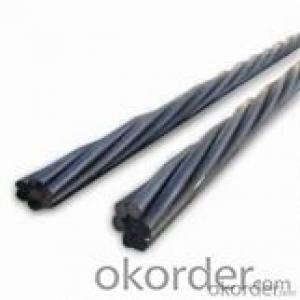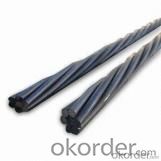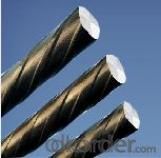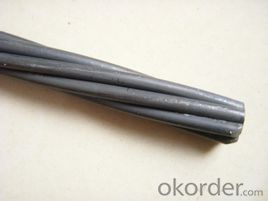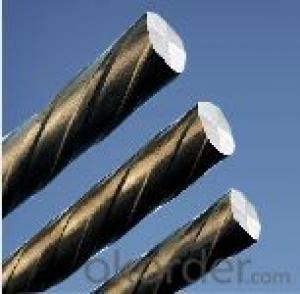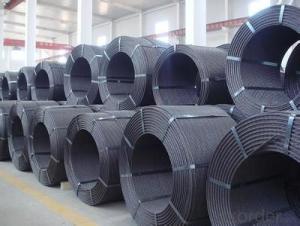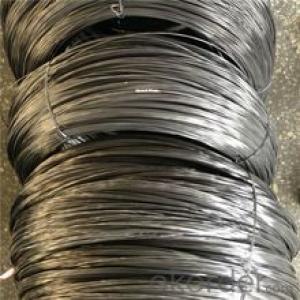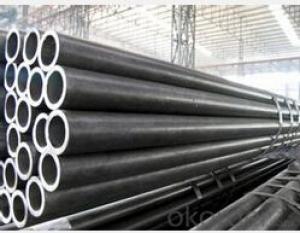High Tensile PC Steel Wire with Spirals
- Loading Port:
- Tianjin
- Payment Terms:
- TT OR LC
- Min Order Qty:
- 100 m.t.
- Supply Capability:
- 3000 m.t./month
OKorder Service Pledge
OKorder Financial Service
You Might Also Like
Product Description:
1、Structure of High Tensile PC Steel Wire with Spiral Ribs Description:
Prestressed Concrete Steel Wire, also named PC steel wire orPC wire, is made from high carbon steel with low relaxation high tensile strength. PC wires are sorted into plain surface PC wire, spiral ribs PC wire and indented PC wire. They are commonly used for concrete structure reinforcement such as highway, high-speed railway projects, large-span bridges, overhead crane beam, coal mines.
2、Main Features of High Tensile PC Steel Wire with Spiral Ribs:
•Perfect cohesion. Spiral ribs and indented surface can strengthen the bond between wire and concrete, thus it improves the performance of the PC products and extends its life.
•Low relaxation high tensile strength. With low relaxation 2.5% and tensile strength up to 1860Mpa.
3、High Tensile PC Steel Wire with Spiral Ribs Images:
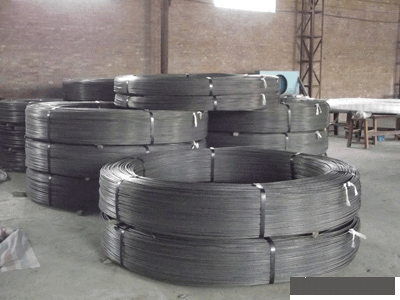
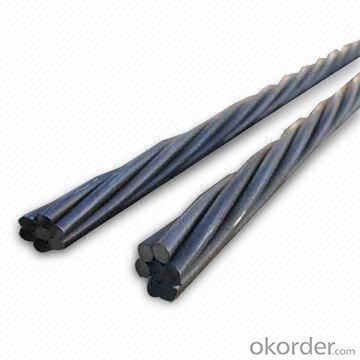
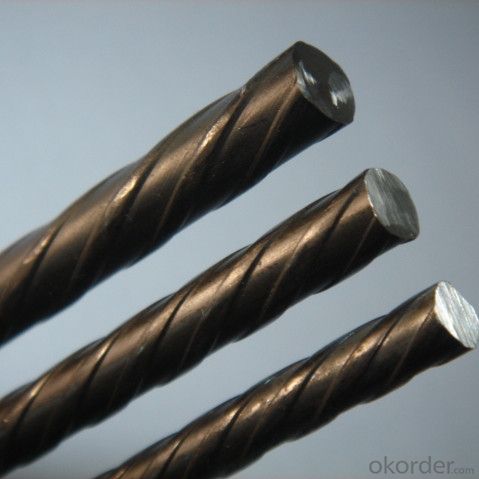
4、High Tensile PC Steel Wire with Spiral Ribs Specification:
Quick Details
Steel Grade: 77B or 82B high carbon wire rod
Standard: GB
Wire Gauge: 4.0mm to 10.0mm
Place of Origin: Tianjin, China (Mainland)
Type: PC
Application: Construction
Model Number: 4.0mm to 10.0mm
Packaging & Delivery
| Packaging Details: | Each coil is strapped by steel bands and fully wrapped in anti-rust paper & P.P woven sheet. |
|---|---|
| Delivery Detail: | within three week after confirm the order or contract. |
The character of the spiral ribs wire is there are 3-6 protruding ribs on the surface.
The new product was invented by Silvery Dragon in 1991, and the research program of the product includes spiral drawing die, spiral deforming technique etc. 12 proprietary technologies. The product is characteristic of 3 to 6 spiral ribs through spiral deforming drawing on the surface of wire, increasing the bond ability with concrete and raising PC products properties. Since 1997, spiral rib PC wire has already fully took place of indented PC wire, and it has been applied in PC telegraph pole, PC hollow floor plate, PC sleeper, high-speed railway PC sleeper plate, PC water supply pipe etc. Since 1996, it has already been exported to the overseas market. In 2006, the product passed the examination and certificate on the properties by German TU Munich; now the product is applied by Great Britain, Ireland, Bangladesh, German, Poland, etc. more than 30 countries. The production of the product is according to Chinese GB/T5223-2002. Except the shape, other standards for mechanical properties are interchangeable with those popular in the world, or we can use the reasonable standard after consulting with customers.
5、FAQ of High Tensile PC Steel Wire with Spiral Ribs:
①How is the quality of your products?
Our products are manufactured strictly according to national and internaional standard, and we take a test on every pipe before delivered out. If you want see our quality certifications and all kinds of testing report, please just ask us for it.
Guaranteed: If products’ quality don’t accord to discription as we give or the promise before you place order, we promise 100% refund.
②How about price?
Yes, we are factory and be able to give you lowest price below market one, and we have a policy that “ for saving time and absolutely honest business attitude, we quote as lowest as possible for any customer, and discount can be given according to quantity”,if you like bargain and factory price is not low enough as you think, just don’t waste your time.Please trust the quotation we would give you, it is professional one.
③Why should you chose us?
Chose happens because of quality, then price, We can give you both.Additionally, we can also offer professional products inquiry, products knowledge train(for agents), smooth goods delivery, exellent customer solution proposals.Our service formula: good quality+good price+good service=customer’s trust
SGS test is available, customer inspection before shipping is welcome, third party inspection is no problem.
Any question, pls feel free to contact us !
- Q: When can I use the PVC pipe and when to use the galvanized pipe?
- PVC pipeline use temperature is -5 to 90 degrees or so, according to the current market price of around 6000 yuan per ton, the price is cheap. Its corrosion resistance is good, can resist most of the acid and alkali, and unlike the steel pipe that is easy to rust, so in the construction of the upper and lower water pipes and other fields have gradually replaced the trend of steel pipe.
- Q: What is the difference between steel pipe and fiberglass pipe?
- Steel pipe and fiberglass pipe differ in terms of their material composition, flexibility, resistance to corrosion, and cost. Steel pipe is made of an alloy of iron and carbon, known for its strength and durability, making it a popular choice for plumbing, construction, and industrial projects. In contrast, fiberglass pipe is composed of glass fibers embedded in a resin matrix, resulting in a lightweight and corrosion-resistant material suitable for applications requiring chemical resistance. Another contrasting factor between steel pipe and fiberglass pipe is their level of flexibility. Steel pipe is rigid and stiff, while fiberglass pipe offers greater flexibility, allowing it to bend and conform to different shapes and contours. This flexibility makes fiberglass pipe easier to install in tight spaces or areas with complex geometries. Corrosion resistance is another significant difference between the two materials. Steel pipe is susceptible to corrosion, particularly in environments with high moisture or chemical exposure. To counteract this, steel pipes are often coated or lined with corrosion-resistant materials. In contrast, fiberglass pipe is inherently resistant to corrosion due to its construction, making it a preferred choice for applications in saltwater environments or chemical processing plants. Cost is yet another factor that sets steel pipe and fiberglass pipe apart. Generally, steel pipe is more affordable than fiberglass pipe, especially for smaller diameter pipes. However, as the diameter and pressure rating increase, the cost of steel pipe can exceed that of fiberglass pipe. Additionally, fiberglass pipe requires less maintenance and has a longer lifespan, which can offset the initial cost difference over time. In conclusion, the differences between steel pipe and fiberglass pipe can be summarized in terms of their material composition, flexibility, corrosion resistance, and cost. The choice between these two types of pipes depends on various project requirements, including the application, environment, budget, and expected lifespan.
- Q: Can galvanized steel tubes simmer?
- I make the steel pipe, galvanized pipe and water conveying pipe material is the same, can be bent, specific to what to look at the furnace, can refer to a single material
- Q: What are the different types of steel pipe bends for pipeline routing?
- There are several types of steel pipe bends commonly used for pipeline routing, including the 90-degree bend, 45-degree bend, and the 180-degree bend. Additionally, there are also custom bends available, such as S-bends, U-bends, and offset bends, which are used in specific situations to accommodate unique pipeline routing requirements.
- Q: What are the common materials used for pipe fittings in steel pipes?
- The common materials used for pipe fittings in steel pipes are carbon steel, stainless steel, and ductile iron.
- Q: What does cathodic protection of steel tubes mean?
- Applied current: a macro cell consisting of a protected metal piece and an insoluble auxiliary component. The negative electrode of the battery is connected to the metal to be protected. The power supplies the electrons so that the metal is not corroded by missing points.
- Q: What are the different coatings applied to steel pipes?
- There are several different coatings that can be applied to steel pipes to enhance their corrosion resistance and durability. Some common coatings include epoxy coatings, polyethylene coatings, zinc coatings (galvanization), and polyurethane coatings. Each coating has its own specific benefits and is chosen based on the intended application and environmental conditions.
- Q: How are steel pipes protected against external mechanical damage?
- Steel pipes are often protected against external mechanical damage through a variety of methods such as applying corrosion-resistant coatings, using protective sleeves or wraps, and implementing casing or encasement systems. These measures help to safeguard the pipes from potential physical harm caused by external factors like impact, abrasion, or heavy loads, thus ensuring their integrity and longevity.
- Q: How do you protect steel pipes from external damage?
- There are several ways to ensure the protection of steel pipes from external damage: 1. Coating: To prevent external damage, it is advisable to apply a protective coating on the surface of the steel pipes. Different coating options such as epoxy, polyethylene, and fusion bonded epoxy (FBE) can be used. These coatings act as a barrier between the pipes and the surrounding environment, safeguarding them from corrosion, abrasion, and other external factors. 2. Cathodic Protection: Another method to protect the steel pipes from corrosion is by implementing cathodic protection. This involves connecting a less noble metal, either through sacrificial anodes or an impressed current, to the pipes. By doing so, the corrosive elements are attracted to the sacrificial metal, sacrificing it instead of the pipes. This process helps increase the pipes' lifespan and shields them from external damage. 3. Wrapping and Taping: To provide an additional layer of protection, it is recommended to wrap the steel pipes with materials like polyethylene or polypropylene tapes. These tapes act as a barrier against moisture, chemicals, and physical impact, ensuring the pipes are shielded from external damage. Additionally, heat shrink sleeves can be utilized to offer insulation and safeguard against corrosion. 4. Underground Installation: Proper installation techniques are crucial for safeguarding steel pipes from external damage. This includes ensuring appropriate trench depth, using suitable backfill materials, and avoiding excessive bending or stress during the installation process. Employing proper bedding and padding techniques also contributes to the pipes' protection against external factors. 5. Regular Inspection and Maintenance: It is essential to conduct periodic inspections and maintenance to detect any signs of external damage early on. This can involve visual inspections, non-destructive testing, or the utilization of advanced technologies such as pipeline integrity management systems. Timely repairs and maintenance help prevent further damage and extend the lifespan of the steel pipes. In conclusion, protecting steel pipes from external damage necessitates a combination of preventative measures, proper installation techniques, and regular maintenance. By implementing these strategies, the integrity of the pipes can be preserved, preventing corrosion, abrasion, impact, and other factors that could compromise their structural integrity.
- Q: What is the difference between seamless steel pipes and seamless alloy steel pipes?
- The main difference between seamless steel pipes and seamless alloy steel pipes lies in their composition. Seamless steel pipes are made from carbon steel, while seamless alloy steel pipes are made from various alloying elements such as chromium, nickel, or molybdenum. These alloying elements enhance the properties of the steel, making it more resistant to corrosion, higher in strength, and suitable for specific applications in industries like oil and gas, chemical, or power generation.
Send your message to us
High Tensile PC Steel Wire with Spirals
- Loading Port:
- Tianjin
- Payment Terms:
- TT OR LC
- Min Order Qty:
- 100 m.t.
- Supply Capability:
- 3000 m.t./month
OKorder Service Pledge
OKorder Financial Service
Similar products
Hot products
Hot Searches
Related keywords
